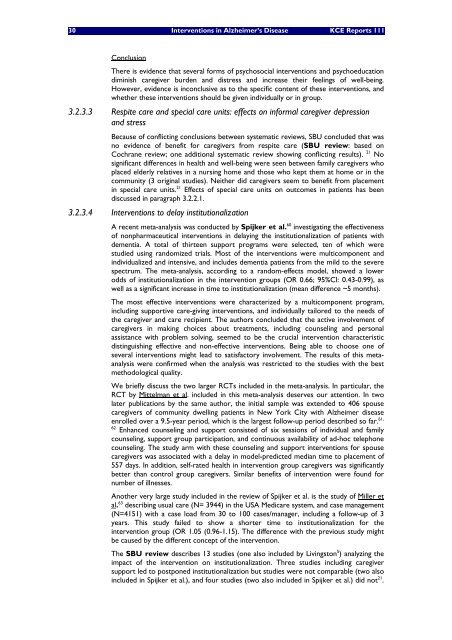Download the full report (112 p.) - KCE
Download the full report (112 p.) - KCE
Download the full report (112 p.) - KCE
You also want an ePaper? Increase the reach of your titles
YUMPU automatically turns print PDFs into web optimized ePapers that Google loves.
30 Interventions in Alzheimer’s Disease <strong>KCE</strong> Reports 111<br />
Conclusion<br />
There is evidence that several forms of psychosocial interventions and psychoeducation<br />
diminish caregiver burden and distress and increase <strong>the</strong>ir feelings of well-being.<br />
However, evidence is inconclusive as to <strong>the</strong> specific content of <strong>the</strong>se interventions, and<br />
whe<strong>the</strong>r <strong>the</strong>se interventions should be given individually or in group.<br />
3.2.3.3 Respite care and special care units: effects on informal caregiver depression<br />
and stress<br />
Because of conflicting conclusions between systematic reviews, SBU concluded that was<br />
no evidence of benefit for caregivers from respite care (SBU review: based on<br />
Cochrane review; one additional systematic review showing conflicting results). 21 No<br />
significant differences in health and well-being were seen between family caregivers who<br />
placed elderly relatives in a nursing home and those who kept <strong>the</strong>m at home or in <strong>the</strong><br />
community (3 original studies). Nei<strong>the</strong>r did caregivers seem to benefit from placement<br />
in special care units. 21 Effects of special care units on outcomes in patients has been<br />
discussed in paragraph 3.2.2.1.<br />
3.2.3.4 Interventions to delay institutionalization<br />
A recent meta-analysis was conducted by Spijker et al. 60 investigating <strong>the</strong> effectiveness<br />
of nonpharmaceutical interventions in delaying <strong>the</strong> institutionalization of patients with<br />
dementia. A total of thirteen support programs were selected, ten of which were<br />
studied using randomized trials. Most of <strong>the</strong> interventions were multicomponent and<br />
individualized and intensive, and includes dementia patients from <strong>the</strong> mild to <strong>the</strong> severe<br />
spectrum. The meta-analysis, according to a random-effects model, showed a lower<br />
odds of institutionalization in <strong>the</strong> intervention groups (OR 0.66; 95%CI: 0.43-0.99), as<br />
well as a significant increase in time to institutionalization (mean difference ~5 months).<br />
The most effective interventions were characterized by a multicomponent program,<br />
including supportive care-giving interventions, and individually tailored to <strong>the</strong> needs of<br />
<strong>the</strong> caregiver and care recipient. The authors concluded that <strong>the</strong> active involvement of<br />
caregivers in making choices about treatments, including counseling and personal<br />
assistance with problem solving, seemed to be <strong>the</strong> crucial intervention characteristic<br />
distinguishing effective and non-effective interventions. Being able to choose one of<br />
several interventions might lead to satisfactory involvement. The results of this metaanalysis<br />
were confirmed when <strong>the</strong> analysis was restricted to <strong>the</strong> studies with <strong>the</strong> best<br />
methodological quality.<br />
We briefly discuss <strong>the</strong> two larger RCTs included in <strong>the</strong> meta-analysis. In particular, <strong>the</strong><br />
RCT by Mittelman et al. included in this meta-analysis deserves our attention. In two<br />
later publications by <strong>the</strong> same author, <strong>the</strong> initial sample was extended to 406 spouse<br />
caregivers of community dwelling patients in New York City with Alzheimer disease<br />
enrolled over a 9.5-year period, which is <strong>the</strong> largest follow-up period described so far. 61,<br />
62<br />
Enhanced counseling and support consisted of six sessions of individual and family<br />
counseling, support group participation, and continuous availability of ad-hoc telephone<br />
counseling. The study arm with <strong>the</strong>se counseling and support interventions for spouse<br />
caregivers was associated with a delay in model-predicted median time to placement of<br />
557 days. In addition, self-rated health in intervention group caregivers was significantly<br />
better than control group caregivers. Similar benefits of intervention were found for<br />
number of illnesses.<br />
Ano<strong>the</strong>r very large study included in <strong>the</strong> review of Spijker et al. is <strong>the</strong> study of Miller et<br />
al. 63 describing usual care (N= 3944) in <strong>the</strong> USA Medicare system, and case management<br />
(N=4151) with a case load from 30 to 100 cases/manager, including a follow-up of 3<br />
years. This study failed to show a shorter time to institutionalization for <strong>the</strong><br />
intervention group (OR 1.05 (0.96-1.15). The difference with <strong>the</strong> previous study might<br />
be caused by <strong>the</strong> different concept of <strong>the</strong> intervention.<br />
The SBU review describes 13 studies (one also included by Livingston 5 ) analyzing <strong>the</strong><br />
impact of <strong>the</strong> intervention on institutionalization. Three studies including caregiver<br />
support led to postponed institutionalization but studies were not comparable (two also<br />
included in Spijker et al.), and four studies (two also included in Spijker et al.) did not 21 .

















